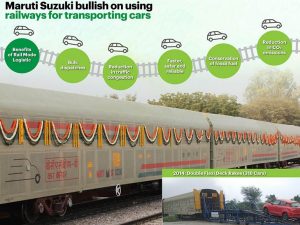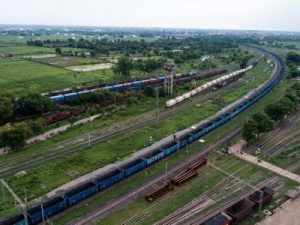Maruti Suzuki India has announced that it has transported more than 6.70 lakh cars via the Indian Railways over the last six years, witnessing a CAGR of over 18 per cent. In this process the company offset nearly 3,000 metric tonnes (MT) of CO2 emissions. Avoiding more than one lakh truck trips on the National Highways has significantly helped reduce carbon footprint and save 100 million litres of diesel, the company claims. In the last financial year, Maruti Suzuki dispatched over 1.78 lakh cars by rail mode, marking 15 per cent increase over previous year. As it further claimed, this accounted for nearly 12 per cent of total sales of the company in the year. Kenichi Ayukawa, Managing Director & CEO, Maruti Suzuki India, said, “Considering the increasing volumes, our team felt the need for large scale logistics flow. We realised, that not only for expansion but also for risk mitigation we have to look beyond road mode logistics.”
Read More »Portall collaborates with GOCON to offer trucking services on PCS1x technology
Portall Infosystems has collaborated with GOCON in order to provide trucking services on PCS1x; a cloud based new generation technology with user-friendly interface The service is already live on PCS 1x. GOCON, a digital transport aggregator platform that connects operators (Trailers and Truckers) with shippers, has on-boarded the collaborative P-CaSo platform. The company is known for its ability to deliver effective transportation solutions vide their own and leased fleet across the country. Shirishchandra Shah, Chief Product Officer, Portall, said “Coming from the well known transportation fleet owner Roadwings – Portall has good reason to believe GOCON will serve the trade well. We thank IPA for their support to add trucking services as a functionality on PCS 1x to better serve the ecosystem.” “We have an established transport company with a large owned and leased fleet who have now embraced digital business. We are pleased to tie up with Portall whose work in the digital landscape of India is well known and appreciated.” Pratyaksh Sureka, Founder, GOCON. IPA (Indian Ports Association), an autonomous body under the Ministry Of Shipping, which launched the PCS 1x in Dec 2018 has been working closely with the trade to expand functionality and features and the addition of this service has ensured that the users can get attractive rates which can help bring down the logistics costs.
Read More »Gadkari emphasises on innovative logistics models to reduce cost in North East
“Unless innovative transportation models are executed, high logistics management cost will remain,” says, Nitin Gadkari, Union Minister for Road Transport & Highways, addressing an e-symposium on logistics management under the e-symposia series on emergent North East India. Speaking specifically on logistics management, Gadkari stresses the need to augment water transport considering its cost effectiveness as compared to road or railway mode of transportation while sharing his insights on possibility of boosting Ro-Ro and Ropax water travel mode for easy connectivity, and cutting short distance coverage using the mighty Brahmaputra. Gadkari believes that institutes have a relatable responsibility to oversee the socio-economic growth of the region. He says, “This can only be achieved through cooperation, coordination and communication with stakeholders of the region.” Also ruing on the country’s extensive import requirement despite the presence of minerals like copper, aluminium, gold, and coal as examples, Gadkari felt that impetus is on management institutes to contribute management strategies and solutions by comprehensively assessing the strengths and weaknesses related to industrial uplift.
Read More »Kuehne+Nagel launches AI-enabled road logistics platform eTrucknow in India
In order to bridge the supply and demand of road logistics via a digital marketplace, Kuehne+Nagel has launched its AI-enabled road logistics platform eTrucknow in India in a webinar with the participation of top company officials and its vendors and distributors from across the country. With eTrucknow, shippers get access to a simplified quotation and booking process for domestic road logistics shipments. Once the shipper provides the shipment details, the AI-enabled engine streamlines and automates the quotation comparison process by validating multiple data points and presents the customer with the most competitive quotation and route. “The intuitive and easy-to-use digital solution has been developed based on our customers’ needs and market trends. The platform’s functionalities are continuously evolving to create an optimal customer experience from an ad-hoc shipment to the regular large volume of shipments,” says Chellan Ganesan, Senior Vice President – Road Logistics, Kuehne+Nagel, Asia Pacific.
Read More »COVID-19 crisis is an opportunity to re-understand the operations: Chander Agarwal
“The most striking thing that has emerged from this entire lockdown is that it has given every company an opportunity to improve their performance, way of working and re-understanding the entire operations and possible marketing as well,” says, Chander Agarwal, Managing Director, TCI Express at the third edition of CargoTalk digital conclave. Interestingly, with the use of technology we have had the lowest cost ever in the history of the company in spite of the fuel prices going up. This crisis has made us much stronger; all the things which were left undone were able to be done now for the betterment of the company and this has made our foundation stronger.
Read More »Logistics industry also need acknowledgement for its hard work: Aditya Shah
Talking about the challenges faced by industry when the lockdown was announced, Aditya Shah, Executive Director, V-Trans India, says that the period of end of March and mid of April which was filled with uncertain times, at the CargoTalk’s third digital conclave. He continues, “Business came to a standstill, trucks were stranded, and cargo was held up whether it is road, airport or seaport. However, logistics being such an essential industry for the backbone of the country, it had to bounce back very fast. The government has ensured the delivery of essentials, right from the beginning, and slowly and steadily also enabled the entire ecosystem around essentials. Things have started moving pretty fast for the industry, however, it was filled with challenges; from obtaining local permissions to ensuring the safety of people and also if people are in place to operate. The challenges which we as an industry have faced have been immense but still the resilience and hard work with which each one of us stood up deserves some acknowledgement.”
Read More »COVID-19 has taught us collaboration: Ashok Goyal
“Covid-19 has brought a new change in our lives,” says, Ashok Goyal, Managing Director, BLR Logistiks at the third edition of CargoTalk’s digital conclave. He informs, “When the lockdown started in March, industry got into a very bad shape and everyone was worried about the future. However, we have gone through it well. If we look at last three months, the progress is phenomenal in terms of how economy has picked up and businesses are back to 75 per cent level. Hence, I see no reason why are not we going to grow the way we were growing earlier as we can also see the younger generation taking over the business, especially road transport which is even considered to be a tough one.” “The crisis has taught us collaboration and has brought everyone closer. We never used to have this kind of unity which we have now and big players are taking help of smaller players in the area where they are not strong” he adds.
Read More »3rd CargoTalk digital conclave today at 10am-12:15pm
The third edition of CargoTalk digital conclave will begin today at 10 am till 12:15 pm. There will be two sessions each of one-hour duration, which will lay emphasis on re-engineering the future. Experts from air cargo and road logistics will share their views. Panelists for first session titled ‘Digitalisation: Building and Enabling Confidence’ (10am-11am) will be Saurabh Kumar, CEO, GMR Hyderabad Air Cargo, Amar More, Director, Kale Logistics Solutions and Keku Gazder, CEO, AAICLAS. For the second session, titled ‘The Road ahead – Driving to Success’ (11:15am-12:15pm), there will be Chander Agarwal, Managing Director, TCI Express, Aditya Shah, Executive Director, V-Trans India and Ashok Goyal, Managing Director, BLR Logistiks.
Read More »Indian Railways operates 2.8 km longest freight train ever, SheshNaag
Indian Railways has created a record by operating a longest Indian goods train ever, named SheshNaag. The rake had a total of 251 wagons pulled by four electric locomotives which were fitted in between. The train had four empty BOXN rakes. At the moment, Indian Railways is prioritising the movement of freight trains in its network by moving multiple freight rakes together as it helps in saving the transportation time and also help in the decongestion of the rail route. “The experiment of attaching multiple rakes of freight trains together and transporting them from one place to another has been successful,” tweets, Piyush Goyal, Railway Minister
Read More »CargoTalk digital conclave to discuss the aspects of road freight movement
The third edition of CargoTalk digital conclave is all set to be held tomorrow, Tuesday, July 7 with a focus on impact of COVID-19 on road logistics. Speakers will include Chander Agarwal, Managing Director, TCI Express, Aditya Shah, Executive Director, V-Trans India and Ashok Goyal, Managing Director, BLR Logistics. The session between 11:15 am to 12:15 pm will discuss how the industry has managed in these challenging times when the world’s biggest lockdown has brought road freight movement to nearly a standstill.
Read More » Cargo Breaking News
Cargo Breaking News









